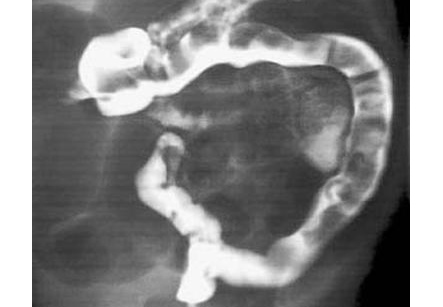Meconium Plugs
Introduction
Meconium means first stools of the baby. Term babies should pass meconium or baby stools in the first 24 hours following delivery. A meconium plug is stool enclosed in a mucus coat which is often more difficult for the baby to pass. Some babies may pass just one plug, others pass more. Meconium plug syndrome is the mildest and most common form of functional obstruction of the intestine in the newborn. It is a transient form of distal colonic or rectal obstruction caused by hard, immobile meconium. The incidence of meconium plug syndrome is estimated to range from one case in 500 to one case in 1,000 neonates. The exact cause of this disorder is unclear.
The plain abdominal X-ray often reveals generalized gaseous distention of intestinal loops of small and large bowel filling the entire abdomen. Contrast enema is usually diagnostic, showing the outline of the meconium plug. As the plug is passed, bowel movements become normal, and all symptoms resolve. Even the neonates with organic disease (such as Hirschsprung’s disease), may pass a meconium plug and do well for a period of time. Therefore, continued observation is required in infants who pass a meconium plug. If symptoms persist, further work-up is required.
Iranian specialists have made remarkable achievements in infants' surgeries and Iran is among few countries that have gained access to the latest surgical technologies

The baby may pass this plug by following ways:
1. Spontaneously
2. After an examination of its bottom
3. As a result of a rectal washout or enema
4. Following an x-ray investigation
In most babies who pass plugs; usually no cause is found. However in some babies there may be an underlying reason. Babies who pass meconium plugs are thought to have an increased risk of either Cystic Fibrosis or Hirschsprung’s disease. There is a simple test available to exclude each of these conditions.
The baby is tested for Cystic Fibrosis by taking a blood sample and Hirschsprung’s Disease by taking a sample of tissue from the lining of the rectum with a small instrument inserted through the baby’s bottom. This is called a Rectal Suction Biopsy.
Both these tests take approximately five working days to obtain the results.
Following the passage of a meconium plug, the baby may behave and feed entirely normally. However, sometimes the baby has a swollen tummy because of a build-up of meconium, wind and milk in the bowel. This may also cause vomiting which is often green due to the presence of bile.
Following the passage of a meconium plug, the baby may behave and feed entirely normally.
If this happens, a drip will be started through a small vein so that intravenous fluids can be given, as the baby will not be able to feed in the normal way. A tube is passed through the baby’s nose into the stomach to drain away the bile (green fluid) collected in the stomach. This reduces discomfort and the risk of vomiting. When the bowel is emptied, the baby can resume normal milk feeds.
In suspected cases of Hirschsprung’s Disease, the baby can develop a serious infection of the bowel. Therefore, washouts of the bowel at least once a day is required until the results of the tests are known. This normally means the baby needs staying in hospital but sometimes it may be possible to arrange this at either the local hospital or at home by a community nurse.
Treatment
Ordinarily, this condition is relieved by X-ray contrast enema. Surgery is rarely required except in unusual situation in which perforation may have occurred. In infants of diabetic mothers, appropriate management of low glucose may be necessary. If the infant does not have Hirschsprung’s disease or cystic fibrosis, there are no long-term complications.
Aftercare
In most cases the results are negative and the baby will be able to go home once the results are confirmed. Passing meconium plugs does not appear to affect these babies in later life.
However, if the baby has a positive result for either of these conditions, the baby will then be referred to the relevant specialist for care and management of the condition.
Waiting for the results is a stressful period for the parents and family, therefore it is advised to speak to either a nurse or doctor of the baby if there are any questions.
This condition should be differentiated carefully from meconium ileus.
The meconium plug:
1. Is located in the distal colon
2. Occurs due to increased viscosity of the meconium
3. Predisposing factor can be an anatomical obstruction due to ileal atresia, cystic fibrosis etc.
4. Outcome is better
Meconium ileus:
1. It is located in distal small bowel
2. Occurs due to decreased colonic motility
3. Predisposing factors may be preterm delivery, magnesium intoxication, hypoglycemia, infants of diabetic mothers, Hirschsprung’s disease.
4. Outcome is worse